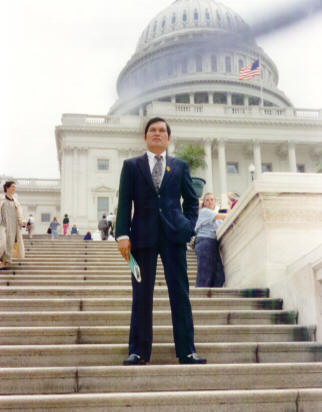Uncommon Betrayal
ABANDONED BY THE
UNITED STATES, FORMER SOUTH VIETNAMESE COMMANDOS RISE FROM THE DEAD
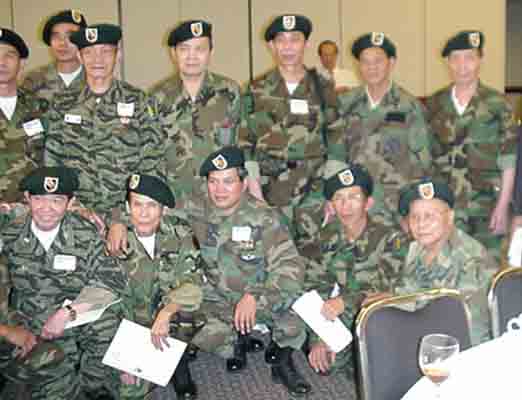
On a moonlit night in
May 1965, a large transport plane was flying low through the skies of
northwestern North Vietnam on its way toward the town of Son La. Sitting
nervously in the back of the plane was Team Horse, a group of five South
Vietnamese commandos who were part of a covert CIA/Department of Defense (DOD)
plan known as Operation Plan 34-Alpha (Oplan-34A). Team Horse was being
parachuted in to reinforce the eight members of Team Easy, who had been deployed
there in August 1963.
After making a first
pass by the drop zone to release crates of supplies and a homing beacon, the
plane circled around again and Team Horse parachuted out the back. Soon after
hitting the ground the commandos knew their mission was a total bust. Soldiers
from North Vietnam's Ministry of Public Security were waiting for them with
rifles in hand. Even worse, Team Easy had been captured long ago, and the North
Vietnamese had used that team's radio equipment to lure in Team Horse
The five commandos
were tried and convicted of treason, and sent to prison. Only one, team leader
Quach Nhung, would survive incarceration. After more than 20 years of hard labor
in a Vietnamese prison, Nhung was released and immigrated to the United States
in 1994. He is one of about 30 former South Vietnamese commandos involved in
Oplan-34A who now live in the Atlanta metro area.
Recently declassified
documents have revealed Oplan-34A to be one of the most tragic and disturbing
aspects of the Vietnam War. `When you read those documents, you want to cry,'
says Sedgwick Tourison, who used many of the papers to write Secret Army, Secret
War--Washington's Tragic Spy Operation in North Vietnam. `It's disgusting. We
sold [those commandos] down the river and walked away, and we did it with such
clean hands. And as I put in the book, nobody thought this would ever surface.'
Even Sen. Arlen
Specter (R-Pa.), chairman of the Senate Select Committee on Intelligence, was
shocked by the abuses. In a recent hearing on Capitol Hill, Specter said, `This
is a genuinely incredible story of callous, inhumane, and really barbaric
treatment by the United States.'
A DOOMED OPERATION
From 1961 through the
end of the decade, approximately 500 commandos separated into 52 small teams
were sent into North Vietnam. Trained and funded first by the CIA, the operation
was taken over by the DOD in 1964. At first, the teams were designed to gather
intelligence, but their duties were later augmented to include psychological
warfare and sabotage. Nearly of the commandos were either killed or captured
almost immediately by the North Vietnamese, who had heavily infiltrated the
operation with moles on the South Vietnamese side.
The entire operation
was a failure, and documents now show that the CIA and the DOD knew that it was.
Still, they continued to send commandos to their almost certain doom.
The United States'
betrayal of the South Vietnamese commandos did not end there.
Once they had been
captured, their families were notified not that they were prisoners of war or
missing in action, but that they were dead. `The Defense Department compounded
that tragedy by simply writing off the lost commandos,' Sen. John Kerry
(D-Mass.) said during the recent Senate hearing. `Drawing a line through their
names as dead apparently in order to avoid paying monthly salaries [to the
families].'
Says Tourison, who is
the former Chief of Analysis in the Defense Intelligence Agency's office of
POW/MIA affairs. `It was money more than anything else. The bottom line was that
we did not want to pay them any more. We were recruiting new guys and telling
them that if anything happens we'll take care of you, and we never had any
intention of doing that. And because of the moles the North Vietnamese had on
the inside, they knew what we had done. And once they found out, that sent a
message to Hanoi that we viewed the lives of those who serve for us as of no
consequence.'
But the betrayal of
the South Vietnamese commandos still did not end there.
Even though the
United States knew many of them were in prison, nothing was ever done to get
them out. As Kerry, himself a Vietnam War veteran, said at the hearing, `After
sending these brave men, on what by anyone's judgment were next to suicide
missions, and after cutting off their pay, we then committed the most egregious
error of all: We made no effort to obtain their release along with American POWs
during the peace negotiations in Paris [in 1973]. As a result, many of these
brave men who fought alongside us for the same cause spent years in prison, more
than 20 years in some cases.'
The U.S. government
is now trying to make up for its treatment of the commandos. On June 19, the
Senate unanimously passed a bill that will pay the former commandos or their
survivors $40,000 each, which basically amounts to an average of $2,000 back pay
per year for an average of 20 years spent in prison.
Even though the
commandos need the money and say they are looking forward to it, money cannot
erase the past. `Forty thousand dollars is nothing,' says Nhung. `No money can
pay for my life.'
COMING TO AMERICA
Recently, three of
the former South Vietnamese Oplan-34A commandos now living in the Atlanta area
sit down to talk about their life during wartime and what moving to America has
meant for them.
The site is the
living room of a cramped apartment in an ersatz Colonial complex on a
predominantly Asian stretch of Buford Highway just across the street from the
Little Saigon strip mall. A group of happy, boisterous kids play on the landing.
A strong odor of simmering soup rolls in from the kitchen.
Sitting around the
table are Nhung, 52; Team Greco deputy commander Quash Rang, 58; and Team
Pegasus leader Than Van Kinh, 67. Acting as interpreter is Ha Van Son, who had
been part of a similar operation, Oplan-35. Son was imprisoned for 19 years and
was also declared dead to his family by the United States. Members of his
operation are also being considered for compensation in the Senate bill.
The men smoke almost
constantly and emit a feeling of haggard world--weariness. They are all dressed
similarly, in Oxford shirts and polyester slacks, and each has salt-and-pepper
hair slicked down and parted to the side. When asked why they joined on with
Oplan-34A, the answer comes quickly and not without some measure of incredulity.
`Because everybody
wanted to fight against the communists,' says Son, speaking for the group
`Nobody fight with any other reason.
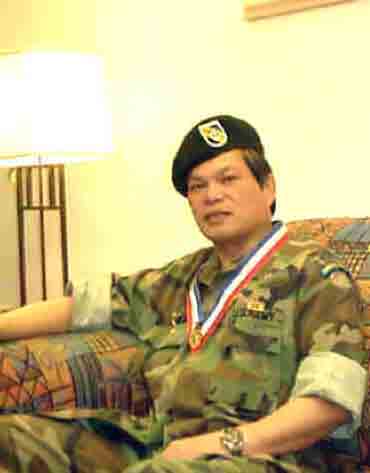
Tourison's book is
filled with wrenching stories of commandos being starved and tortured while in
prison, and the experiences of these men were equally brutal. `All of us were
treated very, very badly,' says Son. `All of us were shackled and put in
a small cell for a long time. After that they take us to a big room where we
concentrate with everybody. But they give us only a little of rice a day.
Sometime no rice, but yellow corn. But the corn that's used for animals, not for
man.'
Even today, many of
the commandos still suffer physically from their time spent in North Vietnamese
prisons. `When we got tortured, everybody has a problem in their body,'
comments Son. `Like Than Van Kinh, all his teeth was broken out.' With that cue,
Kinh opens his mouth wide and taps his dentures with a finger. `And my leg
sometimes is paralyzed. Everybody is like that in the winter. Sometimes we get
pain and hurt in the knee and in the body. You see the outside is good [i.e.,
they look fine from the outside], but inside sometimes from the fall to winter,
if the weather changes, everybody gets pain.'
When they were
released from prison, their lives improved little. Because they were branded as
traitors in Vietnam, it was hard to get work. `It was very, very difficult
because when we go to apply for a job in Vietnam, the Vietnamese communists
check and they know that this was a spy commando,' says Son. `So that everybody
has to go to work as a farmer, and some drive a three-wheeled motorcycle in
Saigon.'
Tourison maintains
that U.S. policy toward the commandos has ruined more than just their own lives.
`In Vietnam, they are largely excluded from all legal forms of employment,' he
explains. `Because of that, the children normally have to cut their education
short to engage in child labor to support their parents. We have visited the
sins on three generations. The older couples, their children, and their
grandchildren.'
In Atlanta, some of
the commandos are retired, but most are employed in various jobs. For example,
Nhung works in a factory that manufacturers containers, Son is a sales and
leasing consultant at an auto dealership, and Rang and his wife own a beauty
salon in Duluth--aptly named American Nails.
Remarkably, the
commandos harbor less anger toward the United States than one might expect. `My
friend Quach Nhung say, everybody still have a little anger with the leaders who
betrayed us, but we know that they are not the representatives of U.S.
government right now, they are not the American people,' says Son, speaking for
his comrade. `Of course, everybody get angry, but we have to talk with the
American people and the American government to [let them] know about the facts
of history. We think we have to fight for justice.'
Son has been informed
that the commandos should receive their back pay from the United States in about
18 months. When they receive those funds, the commandos plan to pool their
resources. `In Atlanta, we have about 30 commandos,' explains Son. `[We] will
establish a joint venture corporation and maybe we will do a business like a
Vietnamese market and everybody will work for our company, every commando and
their family. And we think that corporation may develop for the commandos'
children's future and take care of the old.'
By combining the
money they will get from the U.S. government, the commandos will have a
substantial amount to work with. However, Son admits that when Americans learn
what happened to them and how much the government is planning on compensating
the commandos, many of them are appalled. `American people, they say, you
are worth $4 million, not $40,000,' says Son. `That's very cheap. It's a
little bit.'
LET'S SCREW THEM
AGAIN
Even though life
seems to be on the upswing for the commandos, there are still a few snags. Some
of the commandos, including Than Van Kinh, have had problems bringing their
families to this country. His wife and son have been denied entrance.
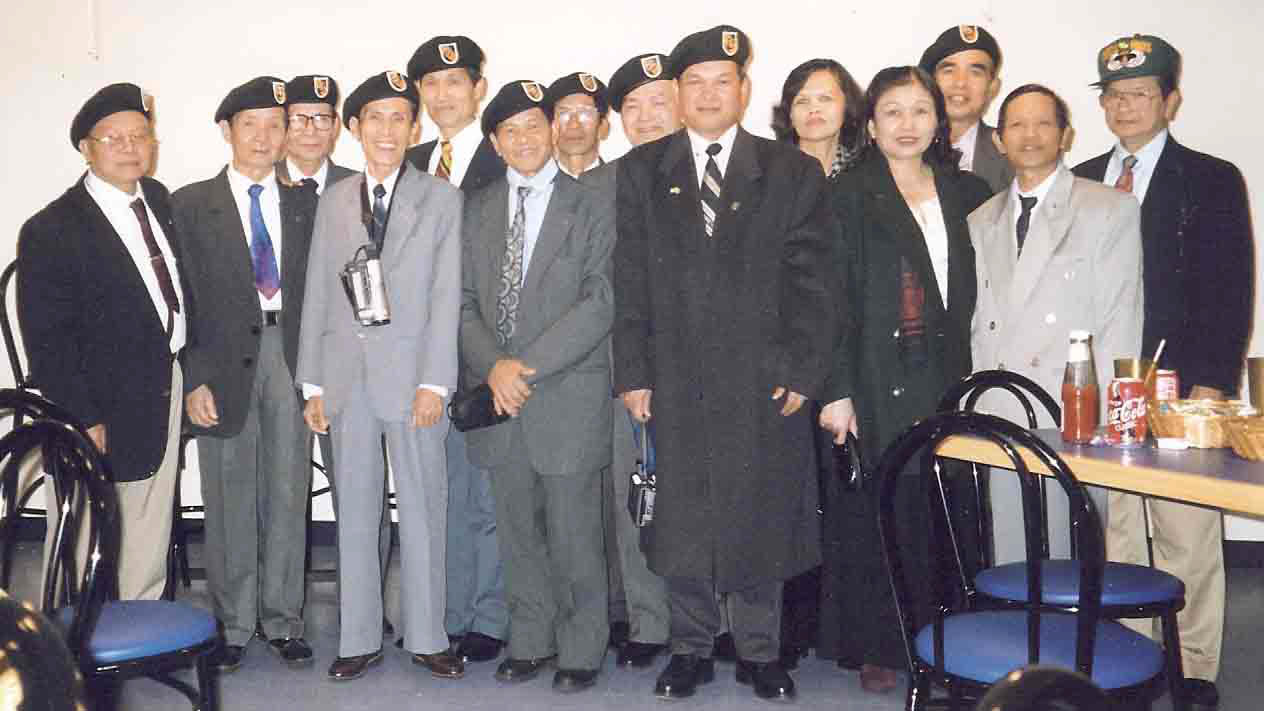
`His wife was denied
with no reason,' says Son, translating Kinh's words. `We were very surprised
because his wife was waiting for him from the time he was captured in North
Vietnam.'
Tourison also
expresses exasperation that Kinh's wife was denied immigration. `Over the last
35 years, Than Van Kinh has spent maybe five or six years with his wife out of
all of his adult life,' he says. `This is a woman who worships the ground this
guy walks on. They've been married since the 1950s, and these sons of bitches
[in the Immigration and Naturalization Service], with a stroke of the pen say,
`Well we just don't believe she's your wife.' What are you going to do at that
point? That's just so damn cruel.'
There are also some
70 former still in Vietnam, some of whom have found getting less than easy.
`This is a relatively
small community of people who paid a higher price than anyone who served us
during the war,' says Tourison. `Unfortunately, the State Department and the INS
give them absolutely no priority. What that means is that when they submit
papers to the embassy in Bangkok applying to depart Vietnam or they get a
request for more documents, it can take six months to a year until someone acts
on it. And you know what happens?
`They die. I have
gotten letters from commandos, and then six months later while they are waiting
for an answer from the embassy in Bangkok, they die. It tears me apart every
damn time that happens because it is so fundamentally wrong and so fundamentally
counter to our own values. They were first in prison, last out, and let's screw
them again.'
As the former
commandos wait for their payment from the United States, as they wait for other
comrades and stranded family members to join them, they say they are enjoying
their lives in America but have not forgotten their homeland. `Of course we miss
Vietnam,' says Son. `And everybody, except Mr. Kinh, who is too old, every
commando thinks if we get a start on an organization, if we have weapons and we
have [money], we want to go back to Vietnam to fight with the communists again.
`My friend Quach
Nhung, he say, of course now I like it in America, it is better than in Vietnam,
but because we have sacrificed for our country and for freedom, we did not like
to see the Vietnamese communists take over. We want Vietnam to be a country with
freedom, human rights, and democracy.'
Despite Authorization, DoD Fails To Pay Vietnamese Commandos
Los Angeles
Times
The Pentagon has
failed to pay restitution to a group of Vietnamese commandos who were left
behind in prison camps at the end of the war, despite legislation authorizing it
to do so.
Congress approved the
legislation last year to compensate a group of about 280 former commandos who
had taken part in U.S. spy missions during the Vietnam War.
The former commandos
were captured in the 1960s and left behind at the war's end, when most other
prisoners of war were freed.
Secret documents
released last year at the request of the Los Angeles Times showed that the U.S.
government had sometimes declared the men dead, even though government agencies
had intelligence reports that they were alive and being held in North Vietnamese
camps or prisons.
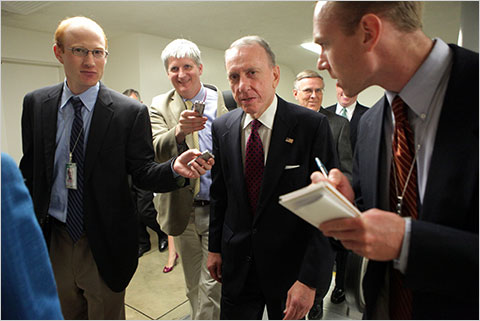
"This conduct is
criminal," said Sen. Arlen Specter, R-Pa.
By a unanimous vote,
the Senate authorized the Pentagon to pay the men $40,000 each for the time they
spent in prison. But Pentagon spokesman Susan Hansen said the Defense Department
believed it could not pay the men, because the language in the bill was unclear.
"We need to ask
Congress to clarify the language," Hansen said. "We want to move forward."
--------------------------------------------------------------------------------
Copyright 1997,96,
The Tech. All rights reserved.
This story was
published on April 4, 1997.
Volume 117, Number
16.

